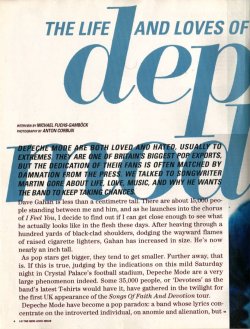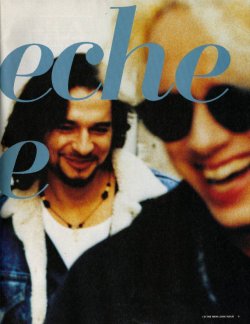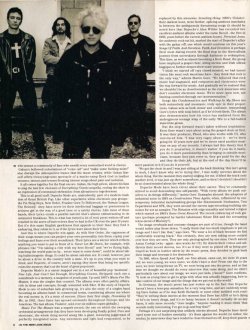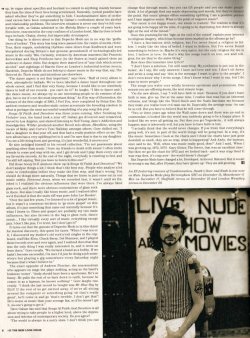The Life And Loves Of Depeche Mode
[I-D, October 1993. Words: Michael Fuchs-Gambock. Pictures: Anton Corbijn.]




Dave Gahan has reinvented himself as Michael Hutchence on Depeche Mode’s world tour…
Depeche Mode are both loved and hated, usually to extremes. They are one of Britain’s biggest pop exports, but the dedication of their fans is often matched by damnation from the press. We talked to songwriter Martin Gore about life, love, music, and why he wants the band to keep taking chances.
Dave Gahan is less than a centimetre tall. There are about 15,000 people standing between me and him, and as he launches into the chorus of I Feel You, I decide to find out if I can get close enough to see what he actually looks like in the flesh these days. After heaving through a hundred yards of black-clad shoulders, dodging the wayward flames of raised cigarette lighters, Gahan has increased in size. He’s now nearly an inch tall.
As pop stars get bigger, they tend to get smaller. Further away, that is. If this is true, judging by the indications on this mild Saturday night in Crystal Palace’s football stadium, Depeche Mode are a very large phenomenon indeed. Some 35,000 people, or ‘Devotees’ as the band’s latest T-shirts would have it, have gathered in the twilight for the first UK appearance of the Songs Of Faith And Devotion tour.
Depeche Mode have become a pop paradox: a band whose lyrics concentrate on the introverted individual, on anomie and alienation, but who attract a community of fans who mouth every memorised word in chorus.
Gahan’s bellowed exhortations of “come on!” and “make some fucking noise!” also disrupt the introspective trance that the music creates, while Gahan himself offers the incongruous spectacle of a macho-camp Rock God in leather trousers, tattoos and tresses fronting intense songs about pain and isolation.
It all comes together for the final encore. Gahan, the high priest, allows his fans to sing the last few choruses of Everything Counts acapella, ending the show in an expression of communal celebration: from alienation to togetherness.
This is all good stuff. Depeche Mode are, undoubtedly, part of a modern tradition of Great British Pop. Like other superlative white electronic pop groups – the Pet Shop Boys, New order, Frankie Goes To Hollywood, The Human League, The Beloved – they have never let their intellectual baggage or pretensions to artiness get in the way of a good tune or a catchy chorus. Like most of these bands, their lyrics exude a painful naivete that’s almost embarrassing in its untutored frankness. This is what has turned a lot of rock press writers off and resulted in the acres of bad reviews they’ve had in the UK over the past 13 years. But it’s this same English gawkiness that appeals to their fans: they find it endearing, they relate to it, as if the lyrics were about their lives.
And this is where Depeche win again. As with New Order, the vagueness of their songs means you can project your own personality into them, replay your feelings and fears over their soundtrack. Their lyrics are a mirror which reflects anything you want to put in front of it. Never Let Me Down, for example, with phrases like “I’m taking a ride with my best friend” and “we’re flying high, watching the world pass us by… never want to come down”, could be about taking hallucinogenic drugs. It could be about sub-dom sex. It could, however, just be about a drive in the country with a mate. It’s up to you what you want to think, and Depeche, of course, aren’t saying; they know that being too specific ruins the mystery that’s at the heart of great pop music.
Depeche Mode’s is a career mapped out in a set of beautiful pop ‘moments’ – New Life, Just Can’t Get Enough, Everything Counts, Stripped; each one a soundtrack to a memory, a snapshot of youth past. Up until 1987’s Music For The Masses, it was the singles that counted. The albums were often patchy affairs, rich in ideas and concepts, though cemented with filler. If the story of Depeche Mode is one of suburban lads growing up, it’s also the story of a singles band becoming an albums band: in commercial terms, considering albums are where the real money is, it’s a story of success. (Since their first single, Dreaming Of Me, in 1981, their fame has spread outwards through Europe and the Americas. The last album, Violator, sold over six million copies globally.)
[I-D, October 1993. Words: Michael Fuchs-Gambock. Pictures: Anton Corbijn.]
Sober, intelligent and thorough article tracing the band's history through the development of their sound and popular appeal. Martin speaks about his reaction to musical changes within the band, especially for Songs Of Faith And Devotion. One of the few articles not to assume that the reader knows nothing about Depeche Mode. Balanced, quality writing.
" If the story of Depeche Mode is one of suburban lads growing up, it’s also the story of a singles band becoming an albums band: in commercial terms, considering albums are where the real money is, it’s a story of success. "




Dave Gahan has reinvented himself as Michael Hutchence on Depeche Mode’s world tour…
Depeche Mode are both loved and hated, usually to extremes. They are one of Britain’s biggest pop exports, but the dedication of their fans is often matched by damnation from the press. We talked to songwriter Martin Gore about life, love, music, and why he wants the band to keep taking chances.
Dave Gahan is less than a centimetre tall. There are about 15,000 people standing between me and him, and as he launches into the chorus of I Feel You, I decide to find out if I can get close enough to see what he actually looks like in the flesh these days. After heaving through a hundred yards of black-clad shoulders, dodging the wayward flames of raised cigarette lighters, Gahan has increased in size. He’s now nearly an inch tall.
As pop stars get bigger, they tend to get smaller. Further away, that is. If this is true, judging by the indications on this mild Saturday night in Crystal Palace’s football stadium, Depeche Mode are a very large phenomenon indeed. Some 35,000 people, or ‘Devotees’ as the band’s latest T-shirts would have it, have gathered in the twilight for the first UK appearance of the Songs Of Faith And Devotion tour.
Depeche Mode have become a pop paradox: a band whose lyrics concentrate on the introverted individual, on anomie and alienation, but who attract a community of fans who mouth every memorised word in chorus.
Gahan’s bellowed exhortations of “come on!” and “make some fucking noise!” also disrupt the introspective trance that the music creates, while Gahan himself offers the incongruous spectacle of a macho-camp Rock God in leather trousers, tattoos and tresses fronting intense songs about pain and isolation.
It all comes together for the final encore. Gahan, the high priest, allows his fans to sing the last few choruses of Everything Counts acapella, ending the show in an expression of communal celebration: from alienation to togetherness.
This is all good stuff. Depeche Mode are, undoubtedly, part of a modern tradition of Great British Pop. Like other superlative white electronic pop groups – the Pet Shop Boys, New order, Frankie Goes To Hollywood, The Human League, The Beloved – they have never let their intellectual baggage or pretensions to artiness get in the way of a good tune or a catchy chorus. Like most of these bands, their lyrics exude a painful naivete that’s almost embarrassing in its untutored frankness. This is what has turned a lot of rock press writers off and resulted in the acres of bad reviews they’ve had in the UK over the past 13 years. But it’s this same English gawkiness that appeals to their fans: they find it endearing, they relate to it, as if the lyrics were about their lives.
And this is where Depeche win again. As with New Order, the vagueness of their songs means you can project your own personality into them, replay your feelings and fears over their soundtrack. Their lyrics are a mirror which reflects anything you want to put in front of it. Never Let Me Down, for example, with phrases like “I’m taking a ride with my best friend” and “we’re flying high, watching the world pass us by… never want to come down”, could be about taking hallucinogenic drugs. It could be about sub-dom sex. It could, however, just be about a drive in the country with a mate. It’s up to you what you want to think, and Depeche, of course, aren’t saying; they know that being too specific ruins the mystery that’s at the heart of great pop music.
Depeche Mode’s is a career mapped out in a set of beautiful pop ‘moments’ – New Life, Just Can’t Get Enough, Everything Counts, Stripped; each one a soundtrack to a memory, a snapshot of youth past. Up until 1987’s Music For The Masses, it was the singles that counted. The albums were often patchy affairs, rich in ideas and concepts, though cemented with filler. If the story of Depeche Mode is one of suburban lads growing up, it’s also the story of a singles band becoming an albums band: in commercial terms, considering albums are where the real money is, it’s a story of success. (Since their first single, Dreaming Of Me, in 1981, their fame has spread outwards through Europe and the Americas. The last album, Violator, sold over six million copies globally.)
